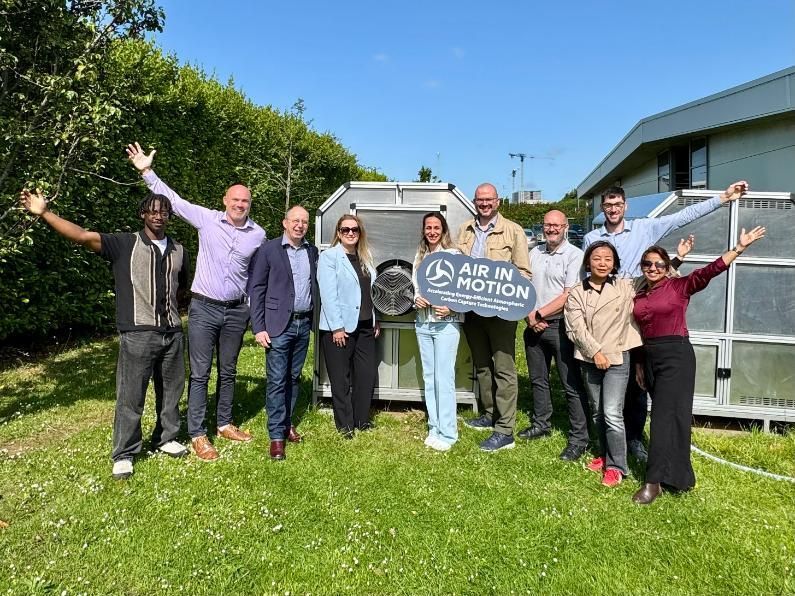Innovative Carbon Capture Technology Tested at Dublin Airport

A groundbreaking new technology developed at Trinity College Dublin is currently being tested at Dublin Airport. This innovative system is designed to capture carbon dioxide (CO₂) directly from the atmosphere, and the team behind its creation is enthusiastic about demonstrating its potential applications in the aviation and e-fuel sectors. This project, known as AirInMotion, has received funding from the prestigious European Innovation Council (EIC) Transition grant and is supported by Enterprise Ireland, underscoring the significance of this initiative in addressing climate change.
The project is spearheaded by Professor Wolfgang Schmitt and Dr. Sebastien Vaesen from Trinity's School of Chemistry and the Taighde Éireann Centre for Advanced Materials and BioEngineering Research (AMBER). Their pioneering work focuses on creating scalable and energy-efficient solutions for atmospheric CO₂ capture, which is vital for reducing industrial emissions. This Direct Air Capture (DAC) technology stands as a critical tool that can aid in achieving net-zero targets and drive meaningful change in the fight against climate change.
The ongoing deployment at Dublin Airport marks the first-ever industrial-scale field test of this cutting-edge technology. For the past three months, the demonstrator has been operational, collecting vital data concerning efficiency, operational stability, and energy consumption. The insights gathered during this testing phase are crucial for validating the performance of the technology and will significantly inform its future development and commercial applications.
Professor Wolfgang Schmitt highlighted the importance of innovation in atmospheric carbon capture, stating, “Atmospheric carbon capture innovations are crucial because they directly address one of the most pressing challenges we face today—reducing carbon emissions from industries that can't easily eliminate them at the source. By advancing and integrating this technology across industries, we are not only reducing emissions but also creating economic opportunities through supplying high-purity CO₂ that align with global sustainability goals.” He expressed optimism about the potential impact of this technology, noting that it could play a central role in the global fight against climate change.
Dr. Sebastien Vaesen, the technical lead of the project, elaborated on the transformative capabilities of the technology, stating, “Our technology is designed for industrial deployment, efficiently capturing CO₂ from the air while utilising low-grade waste heat from industries. We have enhanced CO₂ capture efficiency by integrating innovative design features and optimising key operational conditions using our laboratory test rig.” He also mentioned that the deployment at Dublin Airport is an important step for scaling up the technology, allowing the team to collect critical performance data in a real-world operational environment which will refine the system for long-term sustainable operation.
This technology also seeks to address the European Commission's ReFuelEU Aviation legislation, which mandates that Sustainable Aviation Fuel (SAF) must comprise 2% of fuel at EU airports by 2025, increasing to 70% by 2050. Additionally, this legislation requires that e-fuels, which are produced from renewable electricity and sustainable CO₂, must account for 50% of SAF. By aligning with these regulations, the technology demonstrates its relevance and potential impact in shaping a more sustainable aviation industry.
Andrea Carroll, the Director of Sustainability at daa, the operators of Dublin Airport, expressed enthusiasm for the collaboration, stating, “We are pleased to support Trinity College Dublin's trial of carbon capture technology at Dublin Airport. This project offers daa an opportunity to explore carbon capture as a potential means of decarbonising our operations and industry. The collaboration between Trinity College Dublin and Dublin Airport exemplifies the kind of forward-thinking partnerships that are essential for driving innovation and real change as we all make our way towards a Net Zero world.”
Moreover, Dr. Elham Katoueizadeh, the Project Developer for this technology, emphasized that this innovation is the result of over ten years of dedicated research and development. With the urgent need for scalable carbon capture solutions, the team is now focused on securing additional investments and partnerships to accelerate the commercial adoption of this promising technology. The field test at Dublin Airport is not just a significant milestone for the project but also a vital step towards expanding the technology's reach across various industries.



























